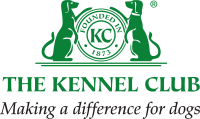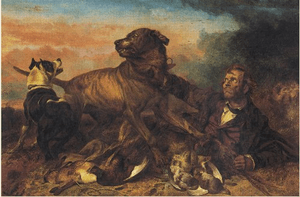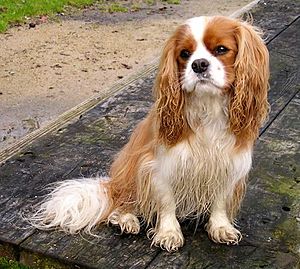The Kennel Club facts for kids
 |
|
| Abbreviation | KC |
|---|---|
| Formation | 4 April 1873 |
| Type | Kennel club |
| Headquarters | London, W1 |
|
Region served
|
United Kingdom |
|
Official language
|
English |
| Affiliations | The Kennel Club Charitable Trust |
The Royal Kennel Club (KC) is the official club for dogs in the United Kingdom. It is the oldest club of its kind in the world. Its main job is to look after different dog activities. These include exciting dog shows, dog agility competitions, and working trials.
The Kennel Club also keeps a national list of pedigree dogs in the UK. Pedigree dogs are dogs whose parents and ancestors are known and recorded. The club also works to speak up for dogs and their owners in the UK. In April 2023, King Charles III gave the club a special 'royal' title. This was to celebrate its 150th birthday!
Contents
Where is The Royal Kennel Club Located?
The Kennel Club has four main places where it operates.
- Its main office is in London. This building has a private club, meeting rooms, an art gallery, and a library.
- A second office in Aylesbury, Buckinghamshire, handles administrative tasks. It is also home to the club's charity.
- The third place is Stoneleigh Park in Warwickshire. Here, you'll find a restaurant, an education center, and showground areas.
- The fourth location is the Emblehope and Burngrange Estate near Hexham, Northumberland. This huge 7,550-acre estate is a special training center for working dogs. It has farms, moorland, and woods. This allows gun dogs to practice hunting and sheepdogs to train with real sheep.
Dog Breeds and Groups
The Kennel Club organizes dogs into seven main breed groups. This helps to classify the many different types of dogs.
- Hound group: Dogs that hunt by scent or sight.
- Working group: Dogs bred to do jobs like guarding or pulling.
- Terrier group: Energetic dogs originally bred to hunt vermin.
- Gundog group: Dogs that help hunters find and retrieve game.
- Pastoral group: Dogs that herd livestock.
- Utility group: A mix of breeds that don't fit into other groups, often with unique jobs.
- Toy group: Small companion dogs.
As of 2021, The Kennel Club officially recognized 222 different dog breeds.
Fun Dog Events: Crufts and Discover Dogs
The Kennel Club gives permission for many dog shows across the UK. However, the only dog show it actually runs itself is Crufts.
- Crufts: This famous show has been held since 1928. It brings in competitors from all over the world. It happens every March at the NEC in Birmingham. Crufts also includes the fun Scruffts show for crossbreed and mixed-breed dogs.
- Discover Dogs: The Kennel Club also hosts the Discover Dogs event in London every autumn. This event started in 1996. It gives people a chance to meet many different dog breeds and talk to experts. You can learn which breed might be a good pet for you. It also features agility competitions and displays by police dogs.
Helping Dogs: The Kennel Club Charitable Trust
The Kennel Club Charitable Trust is a charity that helps dogs. It focuses on their health and well-being.
- The Trust supports research into dog diseases.
- It helps organizations that look after dog welfare.
- It also promotes service dogs, which are dogs trained to help people.
The Trust was set up in 1987. It has given over £10 million to good causes since it started. For example, it has helped the Animal Health Trust with loans and funding for dog cancer research. It also helped build new facilities at the National Agricultural Centre for dog events and training.
Dog Art Gallery
The Kennel Club has its own Dog Art Gallery in London. This gallery is all about fine art that features dogs. It has special exhibitions and a permanent collection of paintings and sculptures. Famous artists like Maud Earl and Richard Ansdell have their work displayed here. The gallery opened in 2003 and is still growing its collection. It helps people who love dogs learn about art, and people who love art learn about dogs!
Helping Breeders: The Assured Breeder Scheme
The Kennel Club had a program called the Assured Breeder Scheme (ABS). It started in 2004. The idea was to help people looking for a puppy find responsible breeders. These breeders would meet certain standards.
The scheme aimed to make sure breeders were doing things correctly. This included checking their homes and paperwork. However, the scheme only included a small number of breeders.
In 2024, The Kennel Club decided to close the Assured Breeder Scheme by the end of the year. They looked at the scheme for two years and talked to many breeders. They found that they needed a better way to help all breeders. They also wanted to make it easier for people buying puppies to get good information.
The Kennel Club plans to create a new system. This new system will encourage good breeding practices and health testing for all registered dogs. It will also make educational resources easier to find for both breeders and puppy buyers. The goal is to improve the health and quality of puppies and give more support to everyone involved.
Bill Lambert, who works for The Kennel Club, said that closing the ABS was a big decision. But he believes they need a way to help more breeders and educate more puppy buyers. The ABS officially closed on December 31, 2024. The Kennel Club is now working on the new system.
Other Programmes
In February 2013, the Kennel Club started a program called "Get Fit With Fido." This program encouraged dog owners to exercise with their dogs to stay healthy.
Pedigree Dogs Exposed
In 2008, a BBC TV show called Pedigree Dogs Exposed raised concerns about the health of some purebred dogs. The show suggested that some breeding practices might not be good for the dogs' health.
After the show, some sponsors stopped supporting Crufts. The BBC also decided not to show Crufts in 2009. The Kennel Club initially disagreed with the show's claims.
However, because of the strong public reaction, The Kennel Club began to make changes. They reviewed the standards for every dog breed. They also made new rules for show judges, requiring them to choose only healthy dogs. New breed standards were announced in January 2009, and close inbreeding was no longer allowed. These changes aimed to improve the health and well-being of all pedigree dogs.
See also
 In Spanish: The Kennel Club para niños
In Spanish: The Kennel Club para niños
 | Selma Burke |
 | Pauline Powell Burns |
 | Frederick J. Brown |
 | Robert Blackburn |



